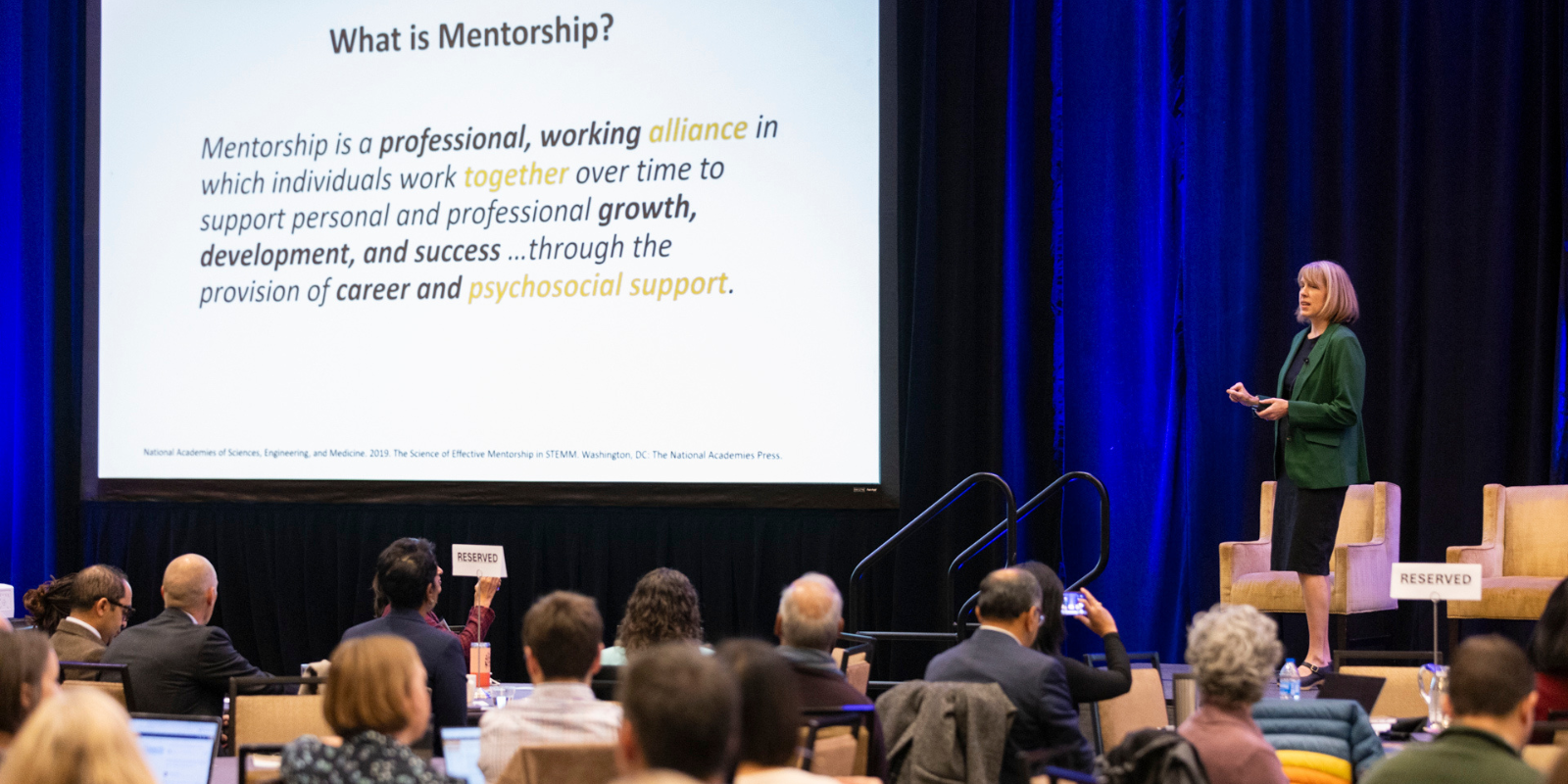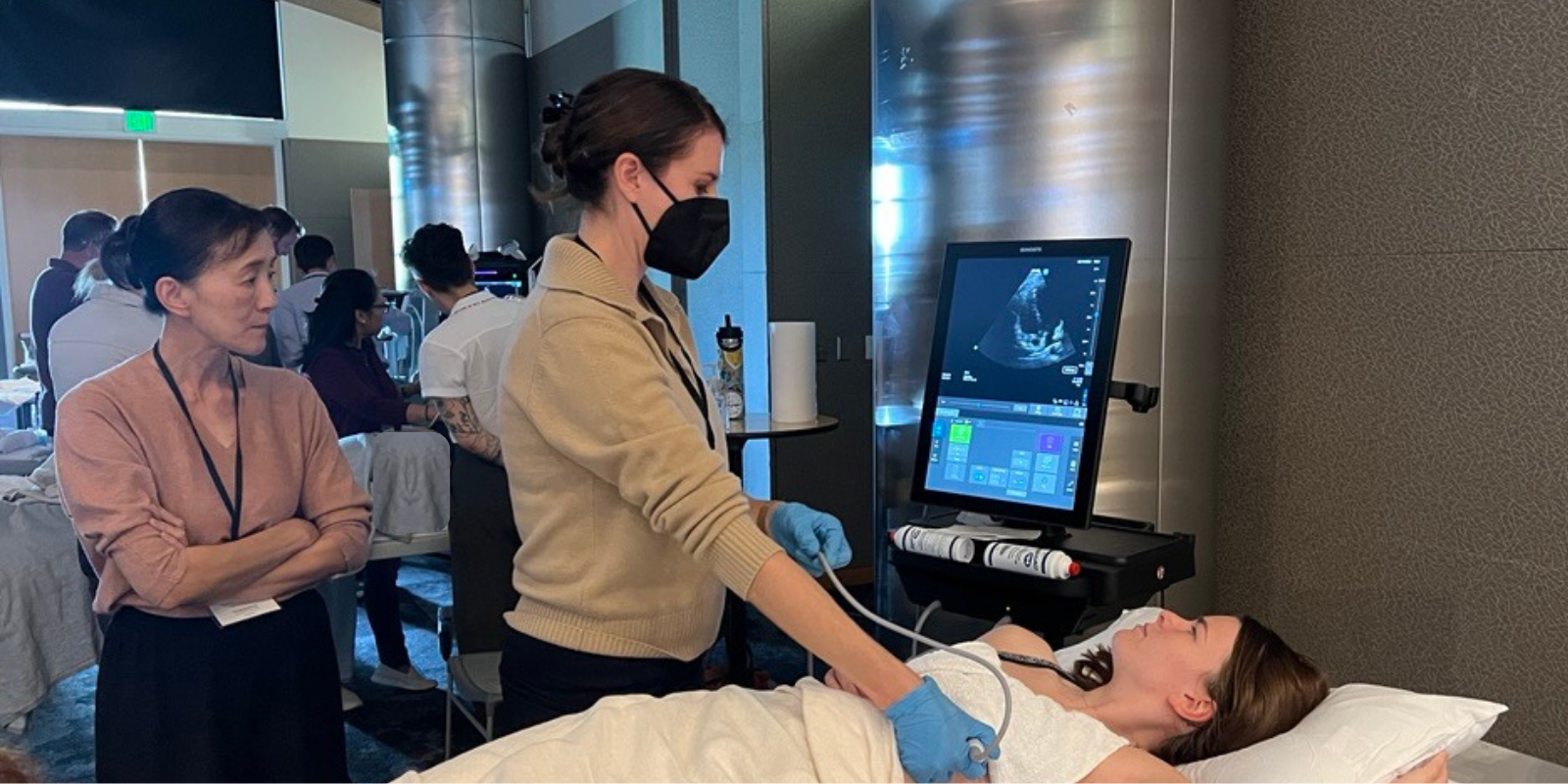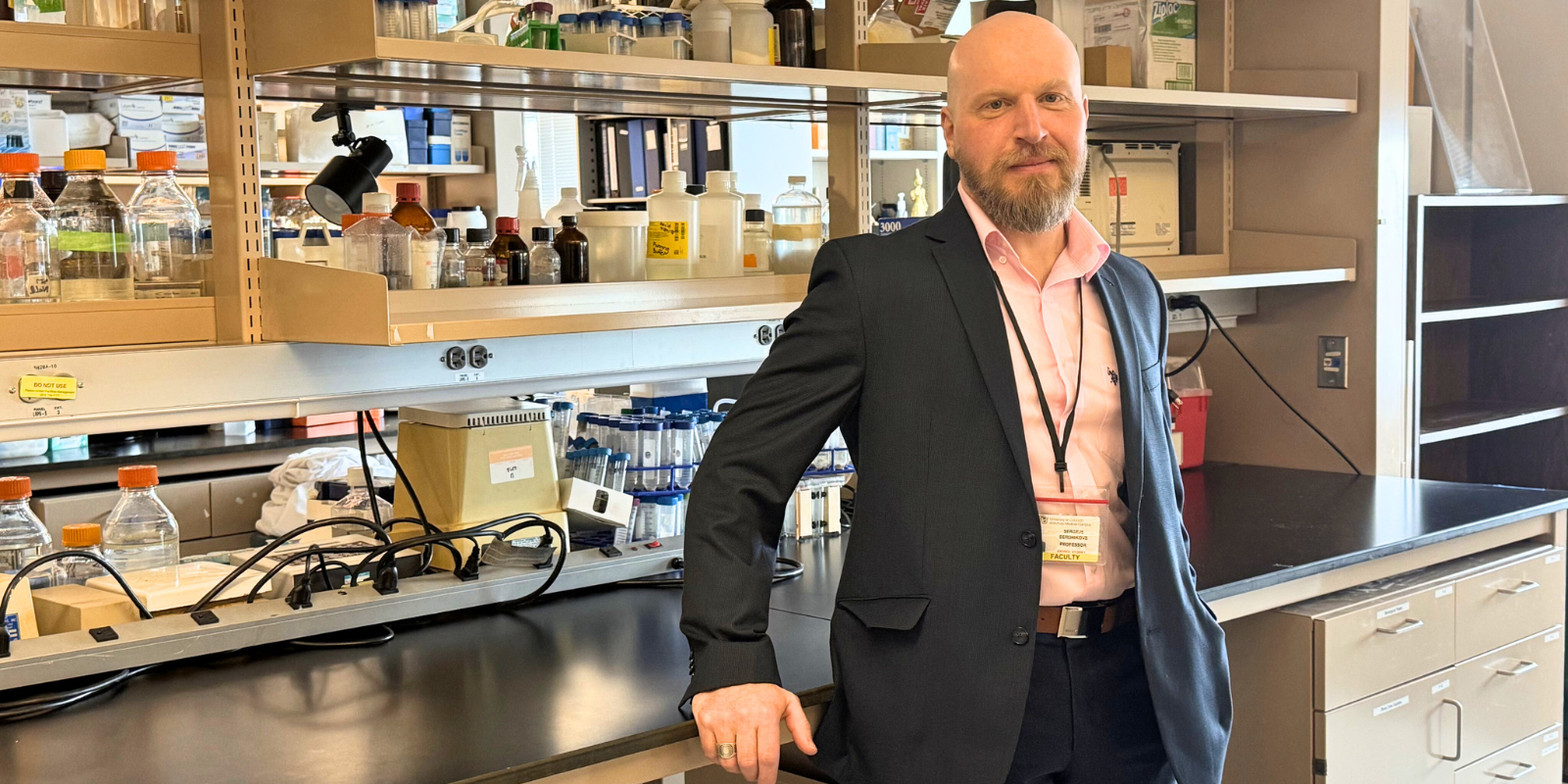What is the secret sauce to developing a successful mentor-mentee relationship? To learn the answer, an estimated 400 health care professionals and trainees from across the globe gathered in Colorado on November 4 for Mentorship Academy, hosted by the University of Colorado Department of Medicine and University of Michigan Department of Surgery.
“We believe mentorship is for everyone,” said CU Department of Medicine Chair Vineet Chopra, MBBS, MD, MSc. “It’s a relationship that brings joy to both parties.”
The annual Mentorship Academy, first held in Michigan in 2017, originated from conversations Chopra had as a junior U-M faculty member with colleagues like Justin Dimick, MD, MPH, who is now chair of the U-M Department of Surgery. They discovered they were having a lot of success with their mentees and wanted to pinpoint how they did it, with the ultimate goal of teaching others to do the same.
“Being a good mentor is taking somebody where they want to go,” Dimick said. “My purpose is to help people and organizations achieve their potential.”
Dimick and Chopra were among 13 experts who spoke throughout the day-long event that touched on different aspects of the mentorship journey, including how to discover one’s purpose, identify a mentor, navigate differences, and evolve into an exceptional mentor themselves. Below are key lessons from their presentations on how to find success as a mentee and mentor.
 Speakers for the 2024 Mentorship Academy shared insights on how to develop successful mentor-mentee relationships on November 4, 2024.
Speakers for the 2024 Mentorship Academy shared insights on how to develop successful mentor-mentee relationships on November 4, 2024.
How to find your purpose, even when your path is unclear
CU School of Medicine Dean John H. Sampson, MD, PhD, MHSc, MBA, said a piece of advice that helped him in his career was to: first, figure out what he wanted to do; second, find someone who was doing something like that; and third, follow what they do.
“The fundamental problem with that is number one is the hardest one. Everybody thinks number two and three are the hardest — figuring out what you really want is hard,” Sampson said. “If you figure out what you really want, it’s actually easy to get there.”
Sunita Sharma, MD, vice chair for faculty development and mentorship in the CU Department of Medicine, also emphasized the importance of knowing your purpose, sharing that it is a key first step to developing a meaningful and beneficial mentor-mentee relationship.
“Purpose in our lives and purpose in our careers are intrinsically tied to each other,” Sharma said.
Discovering purpose takes intentional self-reflection, she added, encouraging attendees to ask themselves the following questions:
- What are your strengths? Ask for input from friends and colleagues.
- What are your motivators and values?
- Who do you do it for?
- What do they want or need from you?
- How do they change as a result of what you do?
Answering these questions will help you write a mission statement, which Sharma described as a declaration to yourself, and potentially to others, about what you specifically want to achieve in your career.
“It’s supposed to reflect your passions and articulate the impact that you want to have,” she said. “There is real power in sharing your mission statement.”
Both mentors and mentees alike should share their mission statements with one another, as it promotes trust and helps clarify the ultimate goals each party has.
“We need to know your why. We need to know the things that motivate you to get out of bed,” she said. “This allows us to provide the scaffolding that you need — the infrastructure, the resources.”
 CU School of Medicine Dean John H. Sampson, MD, PhD, MHSc, MBA, speaking at the 2024 Mentorship Academy.
CU School of Medicine Dean John H. Sampson, MD, PhD, MHSc, MBA, speaking at the 2024 Mentorship Academy.
But what if you are unsure about what your career path will be? It’s an issue that Andrew Ibrahim, MD, MSc, an associate professor of surgery, architecture, and urban planning at U-M, faced early in his career.
“I failed my boards, didn’t match into residency, didn’t think that path was for me at all,” he said. “My path was very unclear.”
Ibrahim connected with Dimick, who began serving as his mentor. One of the most pivotal moments of the mentee-mentor relationship was when Dimick taught Ibrahim how to write a high-impact research paper, Ibrahim said.
“Your first strategy when you want to move forward (in your career) and you don’t know where you’re going — don’t stress so much about the assignment or what the topic is, but focus on the skills. Build the skills, and especially ones that are transferable, like writing, communicating clearly,” he said.
Taking the time to build transferable research skills has contributed greatly to Ibrahim’s success, as he now is the co-director of the U-M Center for Healthcare Outcomes and Policy. In turn, seeing mentees like Ibrahim succeed is what fulfills Dimick’s sense of purpose.
“In every person who works for me — staff, trainees, students, faculty — they have a golden nugget inside them that I need to help them harvest and bring forth into the world,” Dimick said. “That is my purpose.”
 Ruth Gotian, EdD, MS, speaks to the crowd at the 2024 Mentorship Academy.
Ruth Gotian, EdD, MS, speaks to the crowd at the 2024 Mentorship Academy.
How to get a mentor (and why you should have multiple)
The research is clear — people who have mentors will out-earn and out-perform those who don’t, said keynote speaker Ruth Gotian, EdD, MS, a globally recognized expert in mentorship and leadership development.
“They’re happier in their job, they also have lower rates of burnout, and they publish more often,” Gotian said. “Those who are mentored are actually more loyal to the institution. It is the best retention model out there. In fact, mentees get promoted five times more often, and mentors get promoted six times more often.”
Research has found that the majority of people (76%) believe having a mentor is important; yet, less than 40% of people actually have a mentor — and 61% said they never asked someone to be their mentor. Gotian said some people say they are waiting to find the “perfect mentor” who is just like them.
“That person doesn’t exist. And if they do, you’re going to be in an echo chamber. You’re not going to hear diverse perspectives,” Gotian said. “I’ve told you all about the benefit of mentors — that’s what one person can do. Imagine what a team of mentors can do.”
A mentorship team should consist of senior and junior-level peers, people with project experience, colleagues in your field, contacts outside your industry, a community of practice (people who are similar to you), and retirees, she explained.
 From left to right: CU Department of Medicine Associate Vice Chair for Mentorship Christine Jones, MD, MSc, Emory University Department of Medicine Associate Vice Chair of RYSE (DEI) Initiatives Zanthia Wiley, MD, and CU Department of Medicine Chair Vineet Chopra, MBBS, MD, MSc, answer questions from the crowd during the 2024 Mentorship Academy.
From left to right: CU Department of Medicine Associate Vice Chair for Mentorship Christine Jones, MD, MSc, Emory University Department of Medicine Associate Vice Chair of RYSE (DEI) Initiatives Zanthia Wiley, MD, and CU Department of Medicine Chair Vineet Chopra, MBBS, MD, MSc, answer questions from the crowd during the 2024 Mentorship Academy.
However, finding and building a mentorship team can be daunting. That’s why leaders at U-M and CU have invested in creating infrastructure that helps create effective mentorship teams for faculty members.
“All faculty who come into my department have a ‘Launch Team,’” Dimick said, explaining these teams consist of the new faculty member (called the launchee), as well as experienced faculty members and leaders both within and outside of the launchee’s department. The U-M Department of Surgery also has a ‘Boost Teams’ program to support newly promoted associate professors in the department, aiding them as they move into the next phase of their career.
The CU Department of Medicine recently established its own Launch Teams program to support early-career faculty members — a mentorship initiative that faculty leaders like Edward Stenehjem, MD, MSc, the department’s executive vice chair, have participated in to help mentor early-career department faculty.
Stenehjem learned firsthand the value of having a team of mentors when he took on the challenge of leading antibiotic stewardship initiatives in Intermountain Healthcare’s health care network.
“I had to create a team of people that I could surround myself with that could help me be successful in what I wanted to do at Intermountain Health,” he said. “It was a bit of an unlikely team in that there was no consistent specialty … But the thing that they had in common is that they had my best interest in mind, and they cared deeply if I was successful. Because of that team, I was able to move forward with what I wanted to do, and we were successful.”
 Gifty Kwakye, MD, MPH, a U-M research professor and clinical associate professor, speaks to the crowd of attendees at the 2024 Mentorship Academy.
Gifty Kwakye, MD, MPH, a U-M research professor and clinical associate professor, speaks to the crowd of attendees at the 2024 Mentorship Academy.
How to mentor through differences in identity
People are often drawn to form mentoring relationships with people who are similar to them and look like them, said Gifty Kwakye, MD, MPH, a U-M research professor and clinical associate professor.
Yet, there is immense value in forming these relationships with people who differ from one another, as it leads to mutual learning between both mentors and their mentees, she explained.
“They challenge you to think outside of the box, challenge you to look at a problem from a different perspective,” she said. “It helps you break barriers.”
Kwakye grew up in Ghana in West Africa and came to the United States for college, which she said was a “very jarring experience” as she went from being in the majority, as a Black person, to moving to a country where she was a minority.
“And then, as a minority, (I was) being asked to speak on behalf of everyone who was Black just because I looked Black,” she said. “As an African moving into America, my experiences are very different from an African American who has been born and raised here.”
It’s important for people to reflect on the implicit biases they may hold, and to understand that their previous experiences may lead to them making certain assumptions about others.
“You might have had an experience of mentoring someone who looks different than you, and that mentoring relationship could have affected your opinion, and then you transfer that to other folks,” she said.
Kwakye challenged mentors and mentees to be curious.
“Think about someone else’s shoes — their journey. Ask questions. Be vulnerable,” she said, explaining that she has recognized ways that her own assumptions and bias have influenced some of her previous actions. “We need to realize when we have failed, and then also show ourselves grace and grace to others.”
 CU Department of Medicine Chair Vineet Chopra, MBBS, MD, MSc, speaking at the 2024 Mentorship Academy.
CU Department of Medicine Chair Vineet Chopra, MBBS, MD, MSc, speaking at the 2024 Mentorship Academy.
How to become an exceptional mentor
The evolution from being a mentee to a mentor can seem intimidating, but learning to pass the torch is not nearly as daunting as it may seem, said Sushma Cribbs, MD, MSc, the vice chair for faculty development in the Emory University Department of Medicine.
“One question I always get asked is, ‘Am I ready to be a mentor?’ I’m here to tell you — yes, you are,” Cribbs said.
Cribbs’ five tips to effectively transition from being a mentee to a mentor are:
1. Get to know yourself. How do you ideally like to work? What are your strengths and weaknesses? What biases may you have? What mentorship style works well for you?
2. Align your expectations. It is important to have a conversation with your mentee about their goals and expectations. Have your mentee give you specific objectives and timelines for these goals.
3. Communicate effectively. This involves listening actively to your mentee and having regular check-ins — not only to discuss their goals and progress, but also to ask how they are feeling and how you can help.
4. Foster equity, inclusion, and community. Think about how your culture and values will influence your mentoring relationship, and be aware of your conscious and unconscious biases. “By understanding the impact that culture has on our attitudes, behaviors, and expectations, we — as mentors and leaders — can increase our awareness so that we can improve intercultural mentoring practices,” she said.
5. Promote professional development and wellness. This can be done by supporting and facilitating networking, enhancing leadership skills, promoting independence, helping with time management, and assisting with work-life integration. “Remember that their success is your success,” she said.
Janine Higgins, PhD, vice chair for research for the CU Department of Medicine, echoed a similar sentiment, saying mentors should model persistence with positivity.
“Our job is to show our mentees all these possible careers and let them pick which door they want to walk through,” Higgins said. “When they’ve been knocked down, help them get back up and show them that we believe in them — even if they don’t believe in themselves.”
Chopra encouraged attendees to practice being mindful mentors, meaning they guide their mentees with their head and heart. The three rules for mindful mentorship are: people will never forget how you made them feel; to be kind, always; and if you fall seven times, you get up eight times.
“Mentorship is about resilience,” Chopra said. “Accept the defeats. Savor the wins.”
He also shared five mentorship mantras that he encouraged attendees to keep in mind — mentorship is a journey, practice humility, embrace failure, seek empathy and gratitude, and mentor with love.
“Most of us will never forget those mentors who made a positive difference in our lives,” Chopra said. “My challenge to you is: Go be one of those mentors.”



